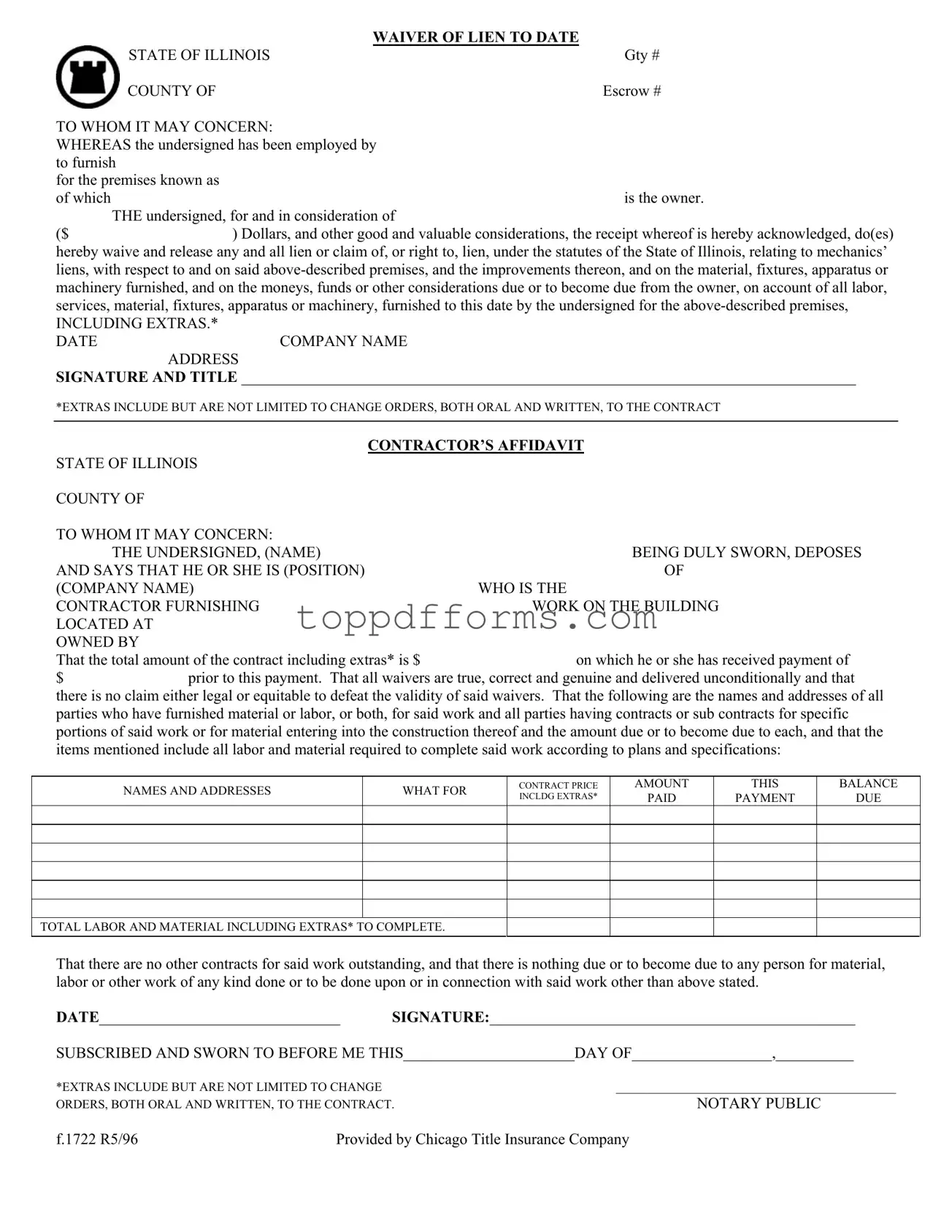Free Chicago Title Waiver Format Form
Things You Should Know About This Form
What is the purpose of the Chicago Title Waiver Format form?
The Chicago Title Waiver Format form serves as a legal document that allows contractors and subcontractors to waive their right to place a lien on a property for unpaid work or materials. By signing this form, the undersigned acknowledges receipt of payment and agrees not to make any claims against the property owner for the specified work. This waiver protects the property owner from potential lien claims and ensures that all parties involved in the construction or renovation are clear about their financial obligations.
Who should use the Chicago Title Waiver Format form?
This form is typically used by contractors, subcontractors, and suppliers who have provided labor or materials for a construction project. It is essential for anyone who wants to formally release their lien rights in exchange for payment. The form is particularly relevant in the state of Illinois, where mechanics' lien laws govern the rights of those who contribute to construction projects. Property owners may also benefit from having this form completed by all parties involved to ensure that they are not subject to unexpected claims.
What information is required to complete the form?
To complete the Chicago Title Waiver Format form, the undersigned must provide several key pieces of information. This includes the name of the company waiving the lien, the property address, the amount being waived, and details about the work performed. Additionally, the contractor must include a list of all parties involved in the project, along with the amounts due to each. The form also requires the signature of the contractor, along with the date and a notary public's acknowledgment to validate the document.
What are "extras" in the context of this form?
In this context, "extras" refer to any additional work or materials that were not included in the original contract but are necessary for the completion of the project. This may include change orders, which can be either oral or written. It is important for contractors to account for these extras when completing the form, as they can impact the total amount due and the validity of the waiver. By acknowledging extras, the contractor ensures that all aspects of the work are covered and that there are no outstanding claims related to additional costs.
File Information
| Fact Name | Description |
|---|---|
| Document Purpose | The Chicago Title Waiver Format form serves to waive any lien rights related to labor and materials provided for a construction project. |
| Governing Law | This form is governed by the statutes of the State of Illinois, specifically those relating to mechanics' liens. |
| Consideration | The undersigned acknowledges receipt of a specified dollar amount as consideration for waiving lien rights. |
| Extras Definition | Extras include change orders, both oral and written, that modify the original contract terms. |
| Affidavit Requirement | The form includes a contractor's affidavit, which must be sworn and signed by the contractor providing work on the project. |
| Payment Acknowledgment | The contractor must declare the total contract amount, the amount received prior to the current payment, and the balance due. |
| Party Information | The form requires a list of all parties involved in providing labor or materials, along with the amounts due to each. |
| Notarization | The document must be notarized to validate the signatures and affirm the accuracy of the information provided. |
Common mistakes
When filling out the Chicago Title Waiver Format form, people often make mistakes that can lead to complications. One common error is leaving out the company name at the top of the form. This information is crucial for identifying the party waiving the lien. Without it, the form may be considered incomplete, potentially causing issues during processing.
Another frequent mistake involves failing to specify the correct property address. The form requires a clear description of the premises. If the address is incorrect or missing, it can create confusion and may invalidate the waiver. Ensuring accuracy in this section is essential for the document's legitimacy.
Many individuals also neglect to include the total contract amount and the amount received prior to the current payment. This information is vital for establishing the financial context of the waiver. Omitting these figures can raise questions about the completeness of the payment history and may lead to disputes later on.
Additionally, some people forget to list all parties who have furnished labor or materials. This section is important for transparency. If not all contributors are named, it could lead to claims from those omitted, undermining the waiver’s effectiveness. Always double-check this section to ensure all relevant parties are included.
Finally, individuals sometimes overlook the need for a notary signature. The waiver must be notarized to be legally binding. Without this step, the waiver may not hold up in court. It is crucial to ensure that the document is properly executed before submission.
Popular PDF Forms
Baseball Tryout Evaluation Form - Players are timed during base running assessments.
Understanding the implications of a Florida Do Not Resuscitate Order is crucial for patients and their families, as this document outlines a clear directive regarding medical care preferences in critical situations. For more information and to access the official form, you can visit floridaformspdf.com/printable-do-not-resuscitate-order-form/, which provides resources to assist in this important decision-making process.
6 Team Single Elimination Bracket With Consolation - Game 3 will determine who advances in the consolation bracket.
Written Estimate for Auto Repair - Provide your vehicle’s make and model for a precise estimate.
